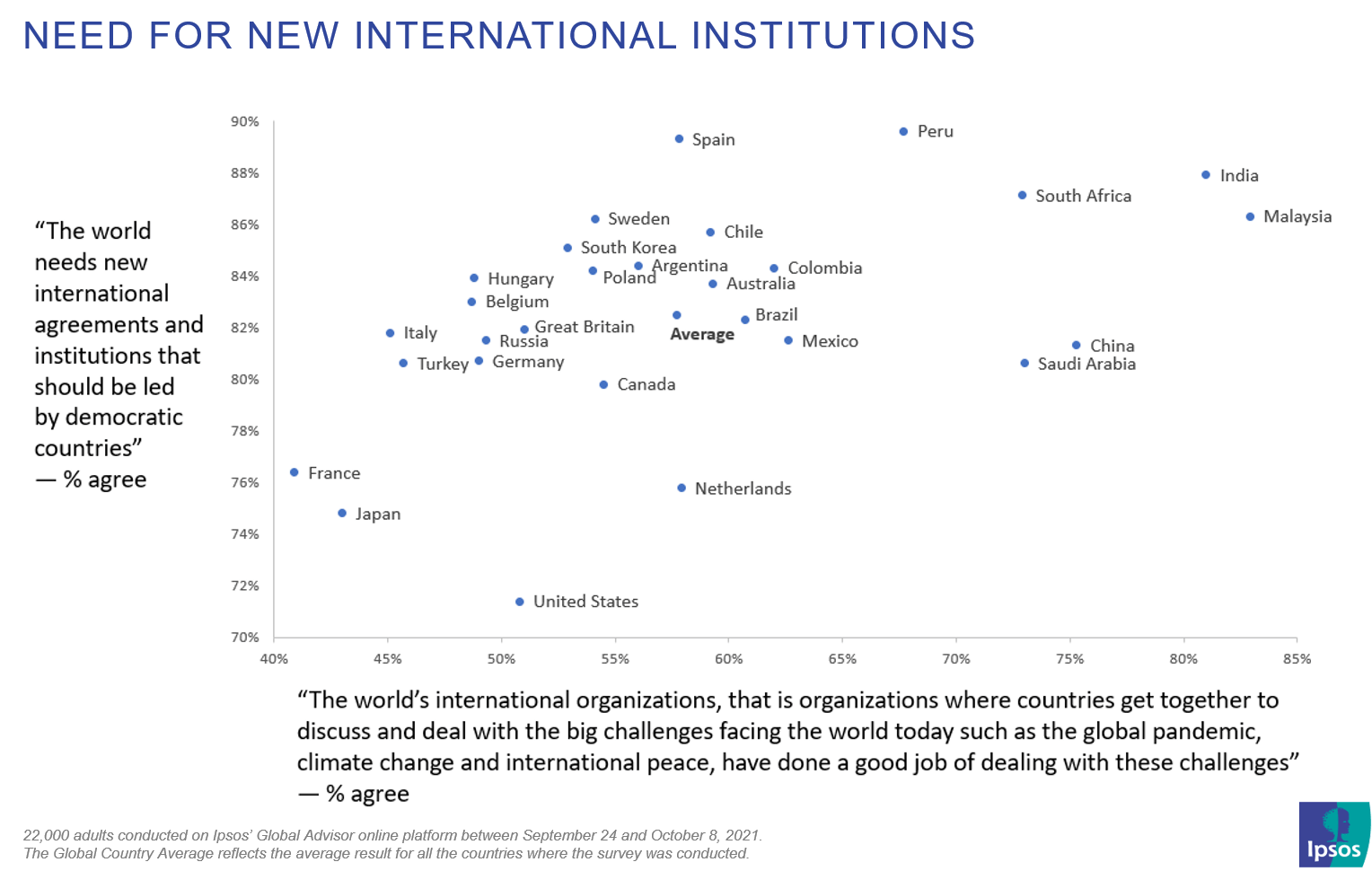Strong worldwide support for new international institutions and agreements led by democratic countries
As the world faces an ongoing pandemic, climate change, and multiple international crises, support for new international institutions and agreements has become nearly unanimous, according to the 12th annual Ipsos global poll for the Halifax International Security Forum. Across 28 countries recently surveyed, an average of 83% say the world needs new international institutions and agreements that are led by democratic countries. Nearly as many, 78%, agree they would have more respect for global institutions or agreements if democratic nations had more influence over them than authoritarian nations. The survey also finds China, the United States, and Russia are the three countries viewed as least likely to comply with any new international agreements and institutions.
These are some of the findings of a survey of more than 22,000 adults conducted on Ipsos’ Global Advisor online platform between September 24 and October 8, 2021.
Increased respect for democratically influenced institutions and agreements
The proportion of citizens agreeing they would have more respect for global institutions or agreements if democratic nations had more influence over them than authoritarian nations increased since last year in 19 of the 28 countries surveyed, with gains of ten points or more in 11 of them. Countries showing the largest increases in agreement from last year are Sweden (+33 points to 80%), the Netherlands (+29 to 73%), Belgium (+28 to 80%), South Korea (+27 to 85%), and Germany (+26 to 76%). The three countries showing decreases from last year are Australia (-7 to 76%), Canada (-7 to 75%), and Malaysia (-7 to 84%). All other countries show changes of no more than +/- 3 points.
Greater respect for democratic nation-led-institutions and agreements is expressed by a large majority of adults in every country surveyed: from 86% in India to 65% in Japan, including 75% in Canada and 71% in the United States, as well as 83% in China, 78% in Saudi Arabia, 76% in Turkey, and 72% in Russia.
Satisfaction with current institutions, but a desire for something new
A global country average of 58% agree the world’s current international organizations have done a good job dealing with challenges such as the global pandemic, climate change, and international peace. However, satisfaction with existing organizations varies widely across countries. It is expressed by at least three in four adults surveyed in India, Malaysia, and China, but fewer than half in France, Japan, Italy, Turkey, Belgium, Germany, Hungary, and Russia.
There is a stronger desire for something new with a global country average of 83% endorsing the view that the world needs new international agreements and institutions led by democratic countries – from 71% in the United States to 90% in Peru.

Skepticism about compliance
However, if new international institutions and agreements were created to deal with big challenges facing the world today, the countries that would be least expected to comply with them are perceived are, in order, China (cited by a global country average of 32%), the U.S. (24%), Russia (21%), Afghanistan (12%), North Korea (9%), and Iran (8%). No other country was named by more than an average of 5%.
Economic might over force
Across 28 countries surveyed, an average of 78% say economic power is more important than military power in world affairs, unchanged since last year. This view is held by a majority of adults in all countries surveyed. Citizens of South Africa (84%), Belgium (83%), Sweden (82%), and Argentina (82%) are the most likely to hold this view, while those in the U.S. (64%), the Netherlands (69%), Great Britain (73%), Australia (74%), and Canada (75%) are the least likely to do so. This opinion has become more prevalent since last year with only two countries showing an increase in this view: South Korea (4 percentage points to 81%) and Mexico (76%), while it is less widely held in Great Britain (-8 to 73%), Australia (-7 to 74%), Peru (-7 to 76%), and South Africa (-7 to 84%).



